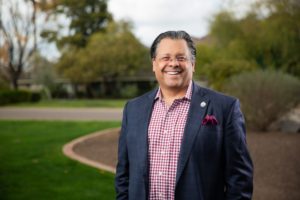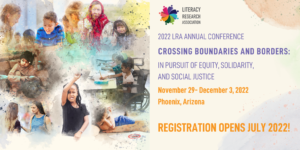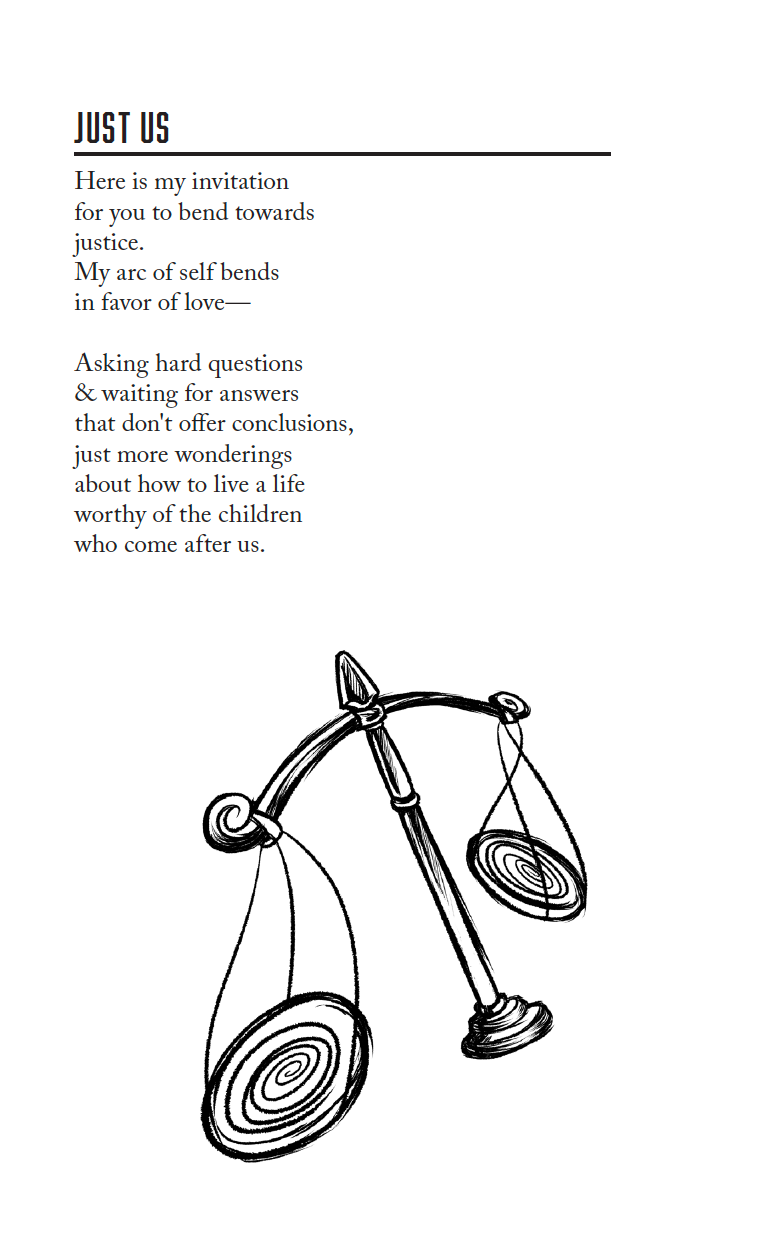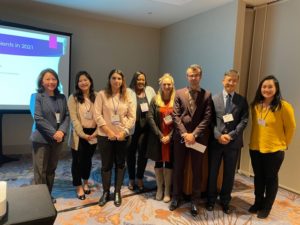|
President’s Message Greetings LRA Family and Friends, I hope this summer has provided some respite from various cares and renewed your spirit! Thanks to LRA’s 72nd Conference Chair and President-Elect, Doris Walker-Dalhouse, and her planning team for their work in organizing a much-anticipated meeting in Phoenix, Arizona at the Arizona Grand Resort and Spa from November 29 – December 3, 2022. For Conference 2022, LRA welcomes plenary speakers Brian Brayboy from Arizona State University, Angela Valenzuela of the University of Texas at Austin, and Guadalupe Valdés, Stanford University and the 2022 recipient of the Distinguished Scholar Lifetime Achievement Award. All of these scholars are National Academy of Education members whose research and writing have been foundational in establishing much of the current thinking regarding approaches to social justice, racial equity and the deep benefits of multilingualism and diversity in today’s schools and society. I want to follow up a bit more on the decision to have only an in-person conference this year, rather than a hybrid one. It is important to know that the choice of venue for the annual meeting involves a blend of intellectual, ethical and business dimensions. First, the business aspect. Choosing a conference location is a long, intensive process (sites are normally chosen 3-years in advance), involving multiple LRA and management company personnel in the decision. The process involves the initial preparation of an RFP that is then sent to dozens of hotel venues, outlining LRA’s goals and logistical needs for the annual meeting, after which begins the careful vetting of numerous hotel and vendor proposals. After a short list of possible sites is identified, each one is visited by a core group of LRA officers and ASG staff to get a clear visual picture of the venue itself and the surrounding area. All along the way, the team is negotiating affordable pricing for accommodations, adequate meeting space, technical support, reasonable catering costs, internet services, and assessing the transportation networks adjacent to hotel properties, just to name a few of areas of decision-making. None of these costs, with the exception of the room rates, are fixed necessarily, so there is an ongoing and lively exchange of information and negotiation between LRA and venue officials nearly up to the dates of the conference itself. As your President, I have come to greatly appreciate the careful planning, judgment, and negotiating skill that is evident on LRA’s behalf in this sophisticated process. Second, on the ethical side, LRA has, indeed, in the past made decisions not to go to states where there have been restrictions, for example, on affirmative action or gender-neutral bathrooms. However, during the last 3 years, in particular, if the advent and ongoing impact of the pandemic weren’t enough disruption, now numerous states are aggressively suppressing voting rights, criminalizing discussions of CRT in classrooms, and imposing narrow approaches to literacy instruction on teacher education programs across the country. Further, with the overturning of Roe vs. Wade and real threats emerging to women’s and families’ health in this post-Roe environment as well as an anti-LGBTQIA2S+ sentiment, the business of choosing a conference site has become dramatically more complicated as most of the states in the South and Southwest where LRA has typically held conferences now have state policies with which LRA does not fundamentally agree. Thus, the current venue selection process involves many more issues to juggle than in the past. Finally, drilling down into the costs and provision of various types of conference hybridity to include the range and type of presentations which is typical of LRA has proven to be a thorny problem. While we are all used to robust internet services at our universities to meet with and collaborate with our colleagues worldwide, to conduct professional development and other business, I was not aware of the costs of providing this service until I asked our chief information officer. At the University of Arizona, the base cost to maintain such services for faculty, staff and students is between one-half and three-quarters of a million dollars. And this cost is actually discounted for research and industry institutions as they use Internet 2, a specialized system of digital resources and networks designed exclusively for supporting the work of research. However, when LRA meets at a hotel venue, the internet providers are commercial, with commercial rates, considerably higher than the Internet 2 cost. Our planning team has compared the costs for various hybrid formats against what other organizations have paid which range easily from $40,000 to well over $100,000 depending upon the type of virtual service provided; and this cost is above and beyond what is paid for digital and technical support of the in-person conference which effectively doubles the cost of conducting the annual meeting. Another factor in this equation is LRA’s relatively small size, fluctuating between 1,200-1,500 members over the past few years. To put it simply, organizations with a membership of 25,000 like AERA and NCTE, and ILA with its 300,000 members worldwide in 128 countries, have more budget to consider a broader scope of digital offerings to their members. In order to get a clearer picture of the changing political and financial landscapes which LRA’s annual meetings are confronting, I appointed a special Conference Venue Committee this year, chaired by former LRA President, Janice Almasi, to do a deep dive into ways that the annual conference can be more affordable, accessible, and aligned with LRA’s values and mission. This committee will present their final report in December at the 2022 Annual Meeting. I would like to mention one more thing, that is, the importance of supporting the e-editors in their efforts to increase the communication capabilities of the new, custom-built website. While the old listserv is no longer available, there are ample ways that communication among LRA members can take place. For example, on the BLOG tab, the e-editors have created a form https://literacyresearchassociation.org/news/submit-content/ where LRA members, Standing and Award Committees, our journal editorial teams, and ICGs can share information related to news, committee updates, and pertinent publication information. LRA is fortunate to have such dedicated members as those of the e-editor team, members of the Technology and Digital Communications Committee, and Headquarters staff who have arduously worked to ameliorate various glitches, create new functionalities, and provide affordances to LRA members to communicate with colleagues and share information relevant to the larger membership. Please take the initiative to share information through the link above or contact the e-editors directly at write@literacyresearchassociation.org. In closing, these past three years have had dramatic, and sometimes tragic consequences for both our personal and professional lives. Nonetheless, LRA’s leadership and its members are continually striving to create an intellectual and professional environment where literacy scholars from all reaches of the planet feel “at home,” as it were, in that their personal and professional interests, values and research are appreciated and valued. The more we communicate with one another, the better we prosper and grow. With great respect and appreciation, David Yaden |
|||||||||||||||||||||||||||||
|
|||||||||||||||||||||||||||||
|
Message from the Conference Chair and LRA President Elect Dear LRA Family, We are enthusiastically awaiting the opportunity to gather again in-person for the 72nd Annual Conference in Phoenix from November 29th-Decemember 3rd, 2022. The past leaders of LRA always envisioned the annual meeting as opportunities for face-to-face networking and reconnecting with old friends in an atmosphere that challenges our thinking and creates opportunities for addressing significant issues impacting literacy research theory, practices, and policies. As members, we value the feeling of being more connected and engaged as presenters, discussants, session chairs, and attendees and the time spent socializing with colleagues in a casual and relaxing environment. Read more. |
|||||||||||||||||||||||||||||
 |
|||||||||||||||||||||||||||||
|
|||||||||||||||||||||||||||||
|
72nd Annual Conference Update Throughout the summer, the 2022 LRA Conference Planning Committee has remained steadfast in its commitment to provide you with an intellectually stimulating, professional engaging, and personally satisfying conference experience. Guided by the theme, “Crossing boundaries and borders: In pursuit of equity, solidarity, and social justice”, we have invited three renowned scholars: Drs. Bryan Brayboy, Angela Valenzuela, and Guadalupe Valdes to share their scholarship, research, and insights with us as plenary speakers in addressing the conference theme. Further information about Drs. Brayboy and Valenzuela can be found on the LRA website. Dr. Guadalupe Valdés, the 2022 Distinguished Lifetime Scholar Award recipient is an expert on Spanish-English bilingualism in the United States. Additional information about this distinguished scholar will soon be shared on the website. Our lineup of speakers is not complete as we will soon be highlighting additional key presenters. Stay tuned! To reach a wide audience of attendees to hear our outstanding plenary speakers and presenters, the Conference Planning Committee has expanded its outreach efforts by inviting state, regional, and local organizations to attend the conference. If you have any recommendations for organizations or individuals that should be invited to attend, then we encourage you to share them with VJ Mayor, LRA Executive Director, at vjmayor@asginfo.net. We want those policy makers, school personnel, community leaders, and fellow researchers to be part of this important conversation and professional development experience sponsored by the primer research organization in literacy. As we continue to plan for our in-person conference, we are mindful that COVID-19 variants and considerations for the health of attendees must also be a priority. The conference Committee has decided not to require proof of vaccination for attendance this year. However, we encourage conference attendees to wear masks that cover their nose and mouth in meeting rooms. In accordance with CDC recommendations, we also encourage attendees to get vaccinated and boosted if eligible and able to do so. Please consult this link for further information. If community levels of COVID-19 are high as we get closer to the conference date, we will revisit the voluntary mask recommendation and communicate the change from voluntary to required making via the website and in e-blasts to the membership. Once you are onsite at the Arizona Grand Resort and Spa, we will be using the same system used last year to communicate preferences for social distancing while interacting with others. Green, yellow, and red stickers will be provided at registration for attendees to put on their badge to indicate their social comfort level. Green stickers will mean that the attendee is most comfortable with handshakes and hugs, yellow stickers will mean fist bumps and elbow taps, while red stickers will mean waves and air high fives. |
|||||||||||||||||||||||||||||
|
|||||||||||||||||||||||||||||
|
|
|||||||||||||||||||||||||||||
|
Acclaimed Professor to Speak at 2022 Conference Dr. Bryan Brayboy, President’s Professor in the School of Social Transformation at Arizona State University, is scheduled to present a plenary address at the Literacy Research Association’s 2022 Annual Meeting in Phoenix, AZ. Dr. Bryan Brayboy, President’s Professor in the School of Social Transformation at Arizona State University, is scheduled to present a plenary address at the Literacy Research Association’s 2022 Annual Meeting in Phoenix, AZ. Read more. |
|||||||||||||||||||||||||||||
|
|||||||||||||||||||||||||||||
 |
|||||||||||||||||||||||||||||
|
2022-2024 STAR Cohort Announced! The STAR program is a two-year cohort model for eight scholars of color in the first two years of a tenure-track literacy appointment. Fellows are then matched with senior scholars of color in our field and organization. As part of the STAR program, fellows and mentors participate in a series of mentoring and research sessions at two annual conferences and in a spring writing retreat. Read about the 2022-2024 STAR Cohort. |
|||||||||||||||||||||||||||||
|
|||||||||||||||||||||||||||||
|
LRA’s New Job Board is Now Live! Whether you are looking for a new position or a new hire, LRA’s job board is the place! Association members from across the world can now view open positions while organizations can post theirs. |
|||||||||||||||||||||||||||||
|
|||||||||||||||||||||||||||||
|
|||||||||||||||||||||||||||||
|
2022 LRA Silent Book Auction We will be reaching out to publishers in the coming weeks seeking donations for the 72nd Annual Conference, regarding the Silent Book Auction being held at the Arizona Grand Resort & Spa, Phoenix, AZ. If you would like to see your work on display and also be part of the auction, please fill out our Silent Auction Questionnaire below. Please complete the form by no later than October 7, 2022. If you have any questions or concerns, please feel free to reach out to LRAHQ. We are here to help! |
|||||||||||||||||||||||||||||
|
|||||||||||||||||||||||||||||
|
|||||||||||||||||||||||||||||
|
2022 LRA In Memoriam Information Request Despite the difficulties and uncertainties in the past year, we have much for which to be grateful, such as family, friends, and LRA colleagues whom we look forward to seeing every year. Unfortunately, several colleagues have passed away this year, and we want to honor them during the 2022 conference. At this time, we ask that you complete the form below, by submitting their names, a photo, and a brief blurb about their life and involvement in LRA. If you have more than one individual that you would like to have memorialized, please fill out the survey for each individual. All submissions must be received by Friday, October 14, 2022. If you have questions or concerns, please reach out to LRAHQ for assistance. |
|||||||||||||||||||||||||||||
|
|||||||||||||||||||||||||||||
|
|||||||||||||||||||||||||||||
|
Now Accepting Award Nominations for… 2022 P. David Pearson Scholarly Influence Award 2022 Arthur Applebee Award |
|||||||||||||||||||||||||||||
|
|||||||||||||||||||||||||||||
|
The Teacher Educators’ Journal (TTEJ) – Call for Manuscripts The Teacher Educators’ Journal (TTEJ) is published by the Virginia Association of Colleges and Teacher Educators (VACTE), a state unit of the Association of Teacher Educators (ATE) and the American Association of Colleges for Teacher Education (AACTE). The journal aims to stimulate discussion and reflection about issues related to teacher education; authors need not be based, and research need not be conducted, in Virginia for manuscripts to be considered for publication. Manuscripts submitted for consideration may be research/empirical reports and analyses, position papers, book reviews, or conceptual essays. To facilitate collaboration amongst teacher education scholars and practitioners and improve teaching, research, and student learning, the theme for the Spring 2023 journal is “Equity Issues in Teacher Education Research and Practice.” Learn more about submission guidelines. Authors should submit an electronic version of their manuscript using the Manuscript Submission Form. All manuscripts must be received by November 1, 2022 for consideration for the Spring 2023 issue. Please direct all questions about the journal to askTTEJ@gmail.com. |
|||||||||||||||||||||||||||||
|
|
|||||||||||||||||||||||||||||
|
LRA Members Publish “Flying Kites: Narratives of Prison Literacies in Essays and Art” We are excited to announce that our book “Flying Kites: Narratives of Prison Literacies in Essays and Art” has been published and is now available to order. It is a JOY to see this book manifest in the world!!! We want to make a special shout-out to our Series Editor, Judith Dunkerly! We felt the best way to learn more about prison literacy was to privilege the voices of incarcerated and formerly incarcerated writers, and in the beginning of 2020, we began the daunting task of soliciting submissions directly from prisons across the United States. In American jails and prisons, notes and letters are commonly referred to as “kites,” and we crossed our fingers as we let the wind carry our invitation away from us. We hope you will buy a copy for your personal library, and suggest that your local public or university library order a copy. 100% of book royalties will go toward El Refugio, an advocacy organization for detained immigrants. We will also be raising money to ensure that all contributing authors receive a physical copy of the book, so please consider donating to the cause (link in comments). We titled the book “Flying Kites” because we want to send a message that literacy learning is vital in all spaces. This book covers the struggles and successes of reading and writing in prisons and detention facilities. We hope you’ll lend an ear to the authors of our book. They have some remarkable stories to tell about reading and writing in American prisons. Order the book today at: https://www.diopress.com/flying-kites Best, Mikel W. Cole, Ph.D. |
|||||||||||||||||||||||||||||
|
|
|||||||||||||||||||||||||||||
|
LRA Wants to Share Your News! Want to share news with the LRA Community or contribute to Critical Conversations? Follow the link in the button below or reach out to our e-editors directly at write@literacyresearchassociation.org to submit content. |
|||||||||||||||||||||||||||||
|
|||||||||||||||||||||||||||||
Category: News
Acclaimed Professor to Speak at Literacy Research Association’s 72nd Annual Meeting
Dr. Bryan Brayboy, President’s Professor in the School of Social Transformation at Arizona State University, is scheduled to present a plenary address at the Literacy Research Association’s 2022 Annual Meeting in Phoenix, AZ. The conference will be held at the Arizona Grand Resort & Spa from November 29th – December 3rd, 2022.
Dr. Brayboy’s research focuses on the role of race and diversity in higher education, and the experiences of Indigenous students, staff, and faculty in institutions of higher education. He is the author of more than 95 scholarly documents, including being the author/editor of eight volumes, dozens of articles and book chapters, multiple policy briefs for the U.S. Department of Education, National Science Foundation, and the National Academy of Sciences.

“We are honored to welcome Dr. Brayboy to the 72nd Annual LRA conference in December,” commented LRA Conference Chair Dr. Doris Walker-Dalhouse. “His expertise in the role of race and diversity in higher education and the experiences of Indigenous students, staff, and faculty align well with the conference theme which focuses on pursuing equity, solidarity, and social justice across multiple boundaries and borders.”
Brayboy has been a visiting and noted scholar in Canada, Australia, New Zealand, and Norway. His work has been supported by the U.S. Department of Education, the National Science Foundation, the Ford, Mellon, Kellogg, and Spencer Foundations, and several other private and public foundations and organizations. He and his team have, over the past 17 years, prepared more than 165 Native teachers to work in American Indian communities and more than 21 American Indian PhDs.
Registration for the 72nd Annual Conference is scheduled to open in late July.
June 2022 Newsletter
| June 2022 | |
| President’s Message
Dear LRA Family and Friends,
Greetings to everyone! I trust this message finds you healthy and thriving!
Welcome to the first LRA newsletter of 2022. This first one will be followed every other month with subsequent newsletters containing a range of information, including membership news, important information about the 72nd Conference, LRA’s strategic plans and collaborations with other professional organizations and much more. Thanks goes to the great team effort by LRA’s e-editors, the Technology and Digital Communications committee, and Headquarters staff in getting the newsletter up and running as well as working diligently to customize the new website and streamline LRA’s communication venues.
Planning for the 72nd LRA Annual Meeting in Phoenix, AZ is in full swing. Conference Chair, Doris Walker-Dalhouse, and Associate Conference Chair, Alfred Tatum, have already created an exciting line up of plenary speakers, including Dr. Angela Valenzuela from the University of Texas at Austin. The reviewing of conference proposals is underway, and thanks again goes to the Area Chairs of the 14 submission areas who, working closely with Doris and Al, will put together a stellar, intellectually stimulating research program in line with this year’s theme of “Crossing Boundaries and Borders: In Pursuit of Equity, Solidarity, and Social Justice.”
LRA is currently involved in three important initiatives with other professional groups. At the 71st Annual Meeting in Atlanta, Carol Lee, President of the National Academy of Education, introduced NA.Ed.’s “Civic Reasoning and Discourse” project and invited the LRA membership to contribute to the creation and dissemination of informational and curricular materials regarding key educational issues of the day and targeted for policymakers, school district officials, parents and teachers, and other interested stakeholders. Some of this information has been created and NA.Ed. President Lee has asked for LRA’s cooperation in dissemination and in the provision of on-going professional development where needed.
Earlier this spring in March, Rob Tierney, President of ILA, initiated a discussion with members of the Reading Hall of Fame and the leadership of ILA and LRA to brainstorm a world-wide mentoring program to include emerging scholars from several countries with a particular focus upon researchers from Indigenous areas, Africa, the Caribbean, and Asian and East Asian countries. The project would involve inviting established scholars from all over the world to volunteer as a mentor to one or more junior researchers in their areas of expertise and interest, in addition to being a sounding board for career and professional trajectories. With affiliates in 128 countries, Rob felt that ILA already has an existing network within which to work and communicate with local researchers and educators.
Over the past several months, beginning with conversations initiated by Past President, Gwendolyn McMillon, LRA has been in discussions with Sage Publishing about presenting a workshop or webinar to LRA membership on topics in Diversity, Equity, and Inclusion. Sage already has an extensive list of resources that they provide to the editorial teams of over 1,000 journals to ensure fair and equitable reviewing procedures. While still in the planning stages, as of now, this webinar or workshop would be open for all LRA members to attend.
One of the ongoing issues across many years in LRA has been discussion about the choice of conference locations and venues. To that end, I created a new Administrative Committee—the Conference Venue Selection Committee—which is chaired by former LRA president, Janice Almasi. This committee’s charge includes exploring the many, complicated issues involved in making this decision such as the costs and logistics of various hotel, conference center and university venues, the internet capabilities for conducting a truly hybrid conference, locations other than in the south, accessibility of travel and local transportation, contract negotiation issues, adjacency to reasonably priced restaurants and entertainment, just to name a few. The final report of the committee’s findings will be presented in December 2022 at the 72nd conference. Other members of the committee include Elena Andrei, Kelley Atkinson, Tiffany Flowers, Gay Ivey, Catherine Lilly, Marla Mallette, Gwen McMillon, Tairan Qiu, and Bettina Buch.
Finally, while 2022 has seen some respite from the spread of COVID-19, LRA has joined other professional organizations such as AERA, the National Academy of Education, and the National Institute of Early Education Research in condemning and mourning the horrific loss of life resulting from recent gun violence at an elementary school in Uvalde, Texas, a supermarket in Buffalo, New York, and a church in Orange County, California. Sadly, in addition to these lives lost, another nine persons were killed and 70 more wounded due to shootings just over the Memorial Day weekend cbsnews.com/news/memorial-day-weekend-mass-shootings-2022. LRA is now in the process of reaching out to AERA, for example, to collaborate in efforts to bring together researchers and educators to discuss and forge plans for research to curb gun violence and support the families of victims.
With appreciation for all that you do,
David Yaden |
|
|
|
|
| Shooting in Uvalde, TX
Once again and too soon, we are mourning more senseless and horrific deaths as a result of another mass shooting in America—this time 19 third, and fourth graders and two teachers at Robb Elementary School in Uvalde, Texas. This unconscionable loss of life and the aftermath of unspeakable pain, grief, and anger should touch us all deeply as literacy educators and researchers. These are our children too. Read more. |
|
|
|
|
| Statement on Recent Murders in Buffalo and Orange County
Once again, we as a nation are grieving the loss of life in both Buffalo and Orange County. This systemic, racist and political/ethnic violence has far reaching and life-altering impacts, not only for the families and communities who are mourning the unconscionable death of their loved ones and neighbors, but for all of us—it changes our journey in this world, our relationships, our identities, our actions. Read more. |
|
|
|
|
 |
|
| Message from the Conference Chair and LRA President Elect
Each new school or community shooting, challenge to texts used for instruction, laws designed to silence the voices of groups of individuals, and rhetoric that creates fear about “the other” and leads to marginalization cause us to pause and ask, “What is next?” While these are just a few of the sources of our individual discontents, we know that there are others not often mentioned but that need to be addressed. There are silences that immobilize us from taking the steps needed to bridge differences in our opinions about the causes and actions needed to correct these issues.
The 72nd Annual Conference is intended to provide an opportunity for us to engage in critical dialogue and as expressed by Isabel Wilkerson, author of Caste: The Origins of our Discontent, that address the longstanding and powerful issues that divide us and operate in silence in “search for the unseen stirrings of the human heart .” This year’s conference committee is working diligently and intentionally to provide opportunities for LRA family and friends to engage in the critical discussions needed to cross the boundaries and borders that negatively impact literacy research, policies, and practices.
Alfred Tatum, Associate Conference Chair, and I want to thank the dedicated Area Chairs, and those of you who submitted proposals and/ or served as reviewers to create a quality program that will be well worth your time and travel to Phoenix. We strongly encourage you to spread the word about this year’s conference and invite colleagues, friends, students, and members of your respective communities committed to change to join us. Conference registration will open later this summer. Look for updated conference information on the LRA website.
Doris Walker-Dalhouse |
|
|
|
|
| Esteemed Education Policy Expert Committed to Speak at Annual Meeting
Dr. Angela Valenzuela, a renowned education policy expert, has committed to speak at the Literacy Research Association’s 72nd Annual Meeting to be held at the Arizona Grand Resort from November 29 – December 3, 2022. Dr. Valenzuela is a professor in both the Cultural Studies in Education Program within the Department of Curriculum & Instruction and the Educational Policy and Planning Program within the Department of Education Leadership and Policy at the University of Texas at Austin where she also serves as the director of the Texas Center for Education Policy. Read more. |
|
|
|
|
 |
|
| Submit Content for Critical Conversations
Critical Conversations (in Literacy Research & Education) is the name of the stream of posts and updates at the front of the LRA website. Our mission is to create a space for students, educators, and researchers to share their narratives to create an inclusive and equitable teaching, learning, and working environment for all. Read more. |
|
|
|
|
| Submit Your 2023 LRA Board Nominations!
WE NEED YOUR INPUT. Please nominate LRA members who are willing to serve a 3-year term as an LRA Board Member or make a 5-year commitment to matriculate through the presidential line (VP-elect, VP, Pres-elect, President, Past President). Read more. |
|
|
|
|
| Accepting Nominations for the 2022 P. David Pearson Scholarly Influence Award
The purpose of this annual award is to honor, in P. David Pearson’s name, the author(s) of an article, chapter, or book written at least 5 years prior to the nomination, which has positively and demonstrably influenced literacy practices and/or policies within district, school and/or classroom contexts. Read more. |
|
|
|
|
| Accepting Nominations for the 2022 Arthur Applebee Award
Please take a moment to submit a nomination for an article for the Arthur Applebee Award for Excellence in Research on Literacy. The deadline is Tuesday, September 6, 2022. The Arthur Applebee Award for Excellence in Research on Literacy is presented annually to honor an outstanding article in literacy research published in a refereed journal in the previous calendar year. Read more. |
|
|
|
|
| Accepting Nominations for the 2022 Brian Street Award
Please consider nominating yourself or someone else for the Brian Street Memorial Award. Brian Street was a British anthropologist whose scholarship helped establish the social turn in literacy research. A core theme of Street’s scholarship was recognizing the dignity and integrity of all people and their uses of written language as they navigated the social, cultural, economic, and political structures of their lives. Read more. |
|
|
|
|
| 2021 Ethnicity, Race and Multilingualism Committee Travel Award Winners
The Ethnicity, Race and Multilingualism Committee (ERM) is committed to supporting and promoting the work of scholars from diverse backgrounds. This year, the ERM awarded eight doctoral student or early career scholars of color the ERM Travel Award to present their research at LRA 2021. The travel award committee (composed of Mandy Stewart, Cynthia Reyes, and Tiffany Flowers) received 22 competitive nominations. We recognize the following awardee’s excellence in literacy research:
The ERM will have another travel award competition to support emerging scholars of color who are presenting their research at the LRA 2022 convention in Phoenix, AZ. We will share the announcement for applications shortly after proposal notifications are sent out.
Congratulations to the 2021 awardees! (They are pictured below with ERM 2021 Chair, Bogum Yoon and Travel Awards Chair, Mandy Stewart.) |
|
|
|
|
The Impact of Gunther Kress on Social Semiotics and Education Open to all! Join the Semiotics in Education SIG on Tuesday, June 28, 2022 at 9:00 a.m. – 10:15 a.m. Eastern Time for an exciting panel featuring the work and legacy of Gunther Kress. Read more. |
|
|
|
|
| Member Publications Flowers, T. A. (2022). A critical call for research about the literacy access of Black incarcerated youth. Journal of Language and Literacy in Education: Scholars Speak Out Series. Access the publication here.
Duo of Scholars Release Critical Issues in Education Text. Investigating Critical & Contemporary Issues in Education by Dr. Tiffany A. Flowers and Dr. Dorian Harrison is a foundational text for undergraduate education majors. The text focuses on the historical and theoretical underpinnings in the field. Additionally, the text features include 21st century topics from civil rights in education, reform, international education, and social and political issues in education. Read more here. |
|
|
|
|
| LRA Mourns the Passing of Dr. Barbara Guzzetti
Dr. Barbara Guzzetti passed away on Saturday, May 21st. Education was Barbara’s lifelong passion. She earned her B.S. and M.S. degrees from Northern University in DeKalb, Illinois, and her PhD. from the University of Colorado, specializing in Reading/Literacy Education. Barbara was a notable researcher, writer, and professor at Arizona State University in the New College of Interdisciplinary Arts and Sciences.
Barbara’s list of academic credits, awards, and citations is endless and her social life has been as fulfilling as her academic one. She was known as a gourmet cook and an animal-rights activist. Barbara will also be remembered by those who joined her in rescuing Havanese dogs.
Barbara is remembered by her friends as representing LRA in many ways. She embodied the values of concern for those marginalized by systems and “business-as-usual” policies. Education was Barbara’s lifelong passion and showed not only in her research but in her dedication to fairness, her profound curiosity and openmindedness, and humble generosity. At her life’s end, she went knowing that her contributions helped make the world a better place. |
Esteemed Education Policy Expert Committed to Speak at Annual Meeting
Dr. Angela Valenzuela, a renowned education policy expert, has committed to speak at the Literacy Research Association’s 72nd Annual Meeting to be held at the Arizona Grand Resort from November 29 – December 3, 2022.
Dr. Valenzuela is a professor in both the Cultural Studies in Education Program within the Department of Curriculum & Instruction and the Educational Policy and Planning Program within the Department of Education Leadership and Policy at the University of Texas at Austin where she also serves as the director of the Texas Center for Education Policy. She is also the author of award-winning Subtractive Schooling: U.S. Mexican Youth and the Politics of Caring(1999) Leaving Children Behind: How “Texas-style” Accountability Fails Latino Youth (2005), and Growing Critically Conscious Teachers: A Social Justice Curriculum for Educators of Latino/a Youth (Teachers College Press, 2016). She also founded and operates an education blog titled, Educational Equity, Politics, and Policy in Texas.
Valenzuela’s research and teaching interests are in the sociology of education, minority youth in schools, educational policy, urban education reform, culturally relevant curriculum, Ethnic Studies, and indigenous education. Dr. Valenzuela’s presentation on the “Struggles for Inclusive Curriculum, Ethnic Studies, and Academic Freedom: Scholars’ Responses to the Conservative Backlash in Texas,” fits seamlessly with the conference theme of “Crossing Boundaries and Borders: In Pursuit of Equity, Solidarity and, Social Justice.”
“We could not be more thrilled to have Dr. Valenzuela as one of our plenary speakers,” said LRA Conference Chair Dr. Doris Walker-Dalhouse. “Her efforts in Texas embody the conference theme as she pursues equity, solidarity, and social justice in her scholarship, research, and service within her local and state communities.”
Against the backdrop of the robust Ethnic Studies Movement in Texas in the quest for curricular inclusion in Texas classrooms and textbooks, Valenzuela will talk about the conservative backlash to these efforts that took form during the (2021) 87th Texas Regular Legislative Session in the form of House Bill 3979, a bill that inaugurated the right-wing movement against the so-called teaching of Critical Race Theory (CRT) in K-12 education coupled with a ban on books addressing content that the Texas GOP finds objectionable.
Registration for the 2022 72nd Annual Conference meeting will open later this summer. For more information, please visit literacyresearchassociation.org/current-conference.
Submit Content for Critical Conversations
Shooting in Uvalde, TX
Dear LRA Family and Friends,
Once again and too soon, we are mourning more senseless and horrific deaths as a result of another mass shooting in America—this time 19 third, and fourth graders and two teachers at Robb Elementary School in Uvalde, Texas. This unconscionable loss of life and the aftermath of unspeakable pain, grief, and anger should touch us all deeply as literacy educators and researchers. These are our children too.
We seem to have come to the point in this country where we can assume there is no safe place. Schools, grocery stores, churches, synagogues, mosques, movie theaters, concerts, restaurants, and many other places have been sites for mass violence. Shootings have been attributed to retribution, anger, fear of the other, mental illness, and other causes. School dress codes have begun including bans on “body armor,” and, in many places, security officers and metal detectors now greet students at the school door. Yet, the violence goes on, seemingly uninhibited.
Gun violence has now outstripped car crashes as the leading cause of death among youth in the United States. There are now more guns in America than people—a shocking average of 120 firearms per person—with Yemen (53) and Serbia (39) a far distant second and third. Firearm deaths of civilians since 1968 have now reached 1.5 million persons—more than the number of soldiers killed in every U.S. conflict since the American War for Independence in 1775. So far, there have been more mass shootings than days in 2022.
The nation’s children, youth, and their teachers are LRA’s intimate partners in our work to understand all forms of literacies—their classrooms are our workplace. All children in schools and the adults who teach and serve them deserve to be safe, but they are not. As concerned citizens and voters, we are not powerless. There are many firearm safety measures which could be passed at both state and federal levels, but are stalled due to political gridlock, and the undue influence of gun advocacy groups. And the sad fact is that there are more police than nurses and counselors in many schools.
In addition to passing firearm safety laws, there is also a dramatic disparity in trained mental health professionals who might be in a position to recognize early on the reasons for an individual’s psychological trauma and treat it before it burgeons into violence and death. Therefore, I urge all of you to do what you can to convince our local, state and federal lawmakers that our children’s safety, physical and mental,—the safety of all of us—should be their first priority.
On behalf of the LRA Board of Directors,

Welcome to Critical Conversations
Welcome to Critical Conversations.
Critical Conversations in Literacy Research & Education is an information source designed to provide researchers, educators, and related stakeholders with tools, resources, and community so that they can connect literacy research with learning experiences.
Our mission is to create a space for researchers, educators, and students to share their narratives to create an inclusive and equitable teaching, learning, and working environment for all.
Critical Conversations is focused on four pillars:
Education: We believe in literacy learning and teaching across multiple modalities with versatile pedagogical skill sets.
Research: We believe in the ethical, socially responsible, systematic investigation into and study of materials and sources, as well as groups of people, to establish facts and reach new conclusions based on diverse methodological approaches and theoretical perspectives.
Equity: We believe in fairness across identity, recognize the historical and contemporary marginalization and erasure of some instead of others, and aim to intentionally include diverse voices.
Solidarity: We believe in unity and community support when working toward common interests.
Content in this feed should focus on making a specific area of expertise more accessible and understandable to a wider audience. We will highlight and amplify work that frames the rigor, social responsibility, and rectitude of academia while identifying opportunities for literacy scholars to speak in a manner that is approachable and accessible.
We believe intellectual, academic work should be accessible and approachable. This means the content is easy to understand and engage with, as well as simple to acquire across platforms. We want our audience to readily receive the work and use it professionally and recreationally.
Together we can seek to rethink dissemination and outreach that impacts research and practice.
Just us
Written by Yolanda Sealey-Ruiz
Love from the Vortex & Other Poems
(Kaleidoscope Vibrations, LLC, 2020)
artwork by the artist 19










